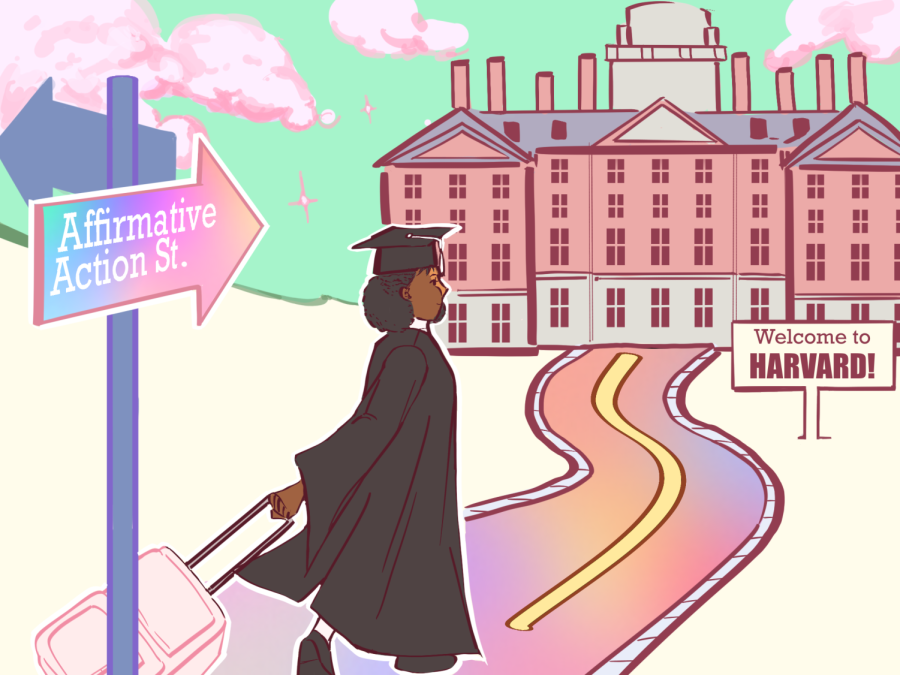Affirmative Action is Vital to America
On a surface level, affirmative action shouldn’t benefit me. I’m your “stereotypical” Asian American from the Bay area with countless APs, 1500+ SAT, and questionable extracurriculars. But there’s more to me than just my stats. I’m a translator for my family, a political interpreter for my parents, and an East-Asian girl who’s had to navigate spaces that actively undermined me. Those experiences have fostered a sense of inquisitiveness and resilience in me. However, without the context of my race, it’s difficult for someone to fully understand me. Opponents of affirmative action say that it’s detrimental to Asian Americans, but the reality is that Asian Americans need affirmative action as well. The Supreme Court (which is ruling on two cases regarding affirmative action: Students for Fair Admissions (SFFA) v. Harvard and Students for Fair Admissions (SFFA) v. University of North Carolina) is signaling for the end of it’s end, and by doing so, will create lasting repercussions in American society.
To understand the importance of affirmative action, we need to understand it first. In the trial SFFA v. Harvard University, SFFA alleges that under affirmative action, “An Asian American with a 25% chance of admission would have a 35% chance if he were white, 75% chance if he were Hispanic, and a 95% chance if he were African American.” This allegation misrepresents race to be the defining factor of a college application. In actuality, race is a contextualizing factor that furthers the understanding of one’s experience and opportunities in the environment they live in. Because let’s face it: we live in a society that has ingrained stereotypes that dictate someone’s behavior solely based on the color of their skin. Statistically, black students are more likely to be suspended for the same infractions as white students and are more likely to be pushed away from higher-level classes which are required to gain access to elite higher education. So, when a university claims that they are treating applicants “holistically” – treating a person as a whole and not in parts – they must take account of race.
If affirmative action is struck down in higher education, there is no doubt that many race-conscious policies will be struck down in the years to come. When Edward Blum, the architect behind the lawsuits against affirmative action, was asked if his goal was to end all laws that consider race, he replied “Yes! Absolutely. I won’t deny it.” At the very least, this should be alarming. Affirmative action creates vital diversity that benefits society. Students exposed to more racial and cultural diversity at school are shown to have “higher levels of academic achievement” and “improved cultural competency” to prepare themselves for the world ahead. In the workplace, affirmative action helps employers “recruit qualified minorities, women, disabled, and veterans.” By mandating “training programs, outreach efforts, and diversity workshops,” it helps eliminate prejudice in the workplace.
Conversely, a lack of diversity can have extreme ramifications. Students who graduate from less diverse schools are more sheltered and when put in a more diverse environment will have a “harder time creating intergroup relations” out in the real world. That in turn can impact the various fields and jobs those students will have in the future. In the field of AI, which is overwhelmingly white and male, the lack of diversity contributes to automated gender and racial biases in algorithms. For a piece of technology that is considered the future of our society, it’s rather concerning that its recognition system routinely classifies photos of darker-skinned people as “gorillas.” Historically, educators have largely been white, and that’s resulted in the Eurocentric curriculum we have today. The outdated, inaccurate, and whitewashed narratives we learn actively contribute to minority students being marginalized in school. Until we introduce more diverse viewpoints and backgrounds, these issues will persist.
Whenever there is discussion about affirmative action, opponents ask: What about meritocracy? Why should an Asian American who is “more deserving” of admission get rejected in favor of a Black student who is “less deserving” of admission? If America were truly a meritocracy – students would get rejected or accepted based on their demonstrated capabilities alone. However, this argument has two issues with it:
The first one being that no one “deserves” admission to an institution. I understand that’s difficult to hear. It terrifies me that even if I had the “perfect” stats and extracurriculars, I won’t be guaranteed admission to my dream school. However, looking at the numbers, Harvard’s class of 2022 had 8,000 applicants with perfect GPAs, 4,000 valedictorians, 18,000+ applicants with a 700 or more on SAT reading, and 20,000+ applicants with a 700 or more on SAT math. Because Harvard only has 2,000 available spots but has thousands of “perfect stats,” virtually anyone’s chances of admission lie in luck.
The second issue is the fact that we do not live in a meritocratic society; we live in a society marred by centuries of racism whose effects persist today. A meritocracy did not exist for the enslaved Africans and the people of color living under Jim Crow, and it still does not exist today when black students are barred from success when they are discriminated against in schools. Why should we call ourselves colorblind when color soaks every moment of our past, present, and future?
Now don’t get me wrong: Harvard admissions are far from perfect. Harvard itself says that when reaching out to students in “sparse country” (areas in the US that are underrepresented in the student body), it contacts “any black student who scores above 1,110” on the PSAT but contacts female Asian students only if their score “is above 1,350.” But this doesn’t mean that affirmative action is to blame. Instead, what is occurring here is the false model minority myth that generalizes an incredibly diverse racial group as monolithic and high-achieving. This myth negatively impacts society’s perception of Asian Americans as individuals, and influences how Asian Americans go through their day to day lives. However, the solution to combating these negative stereotypes is not to do away with affirmative action, a policy that not only impacts Harvard admissions but all college admissions in the US; It’s to pay more attention to race and the diversity of Asian American experiences.







